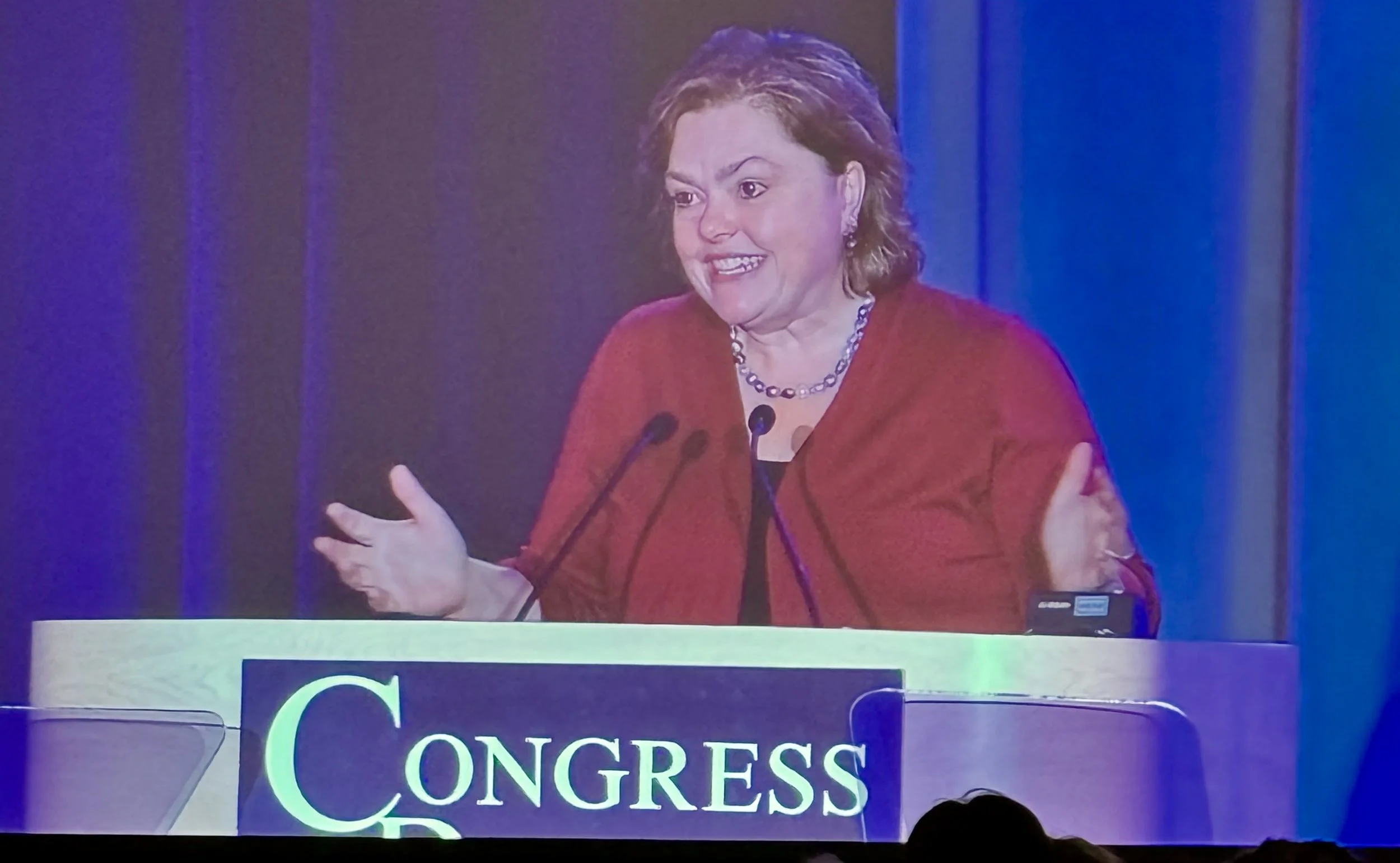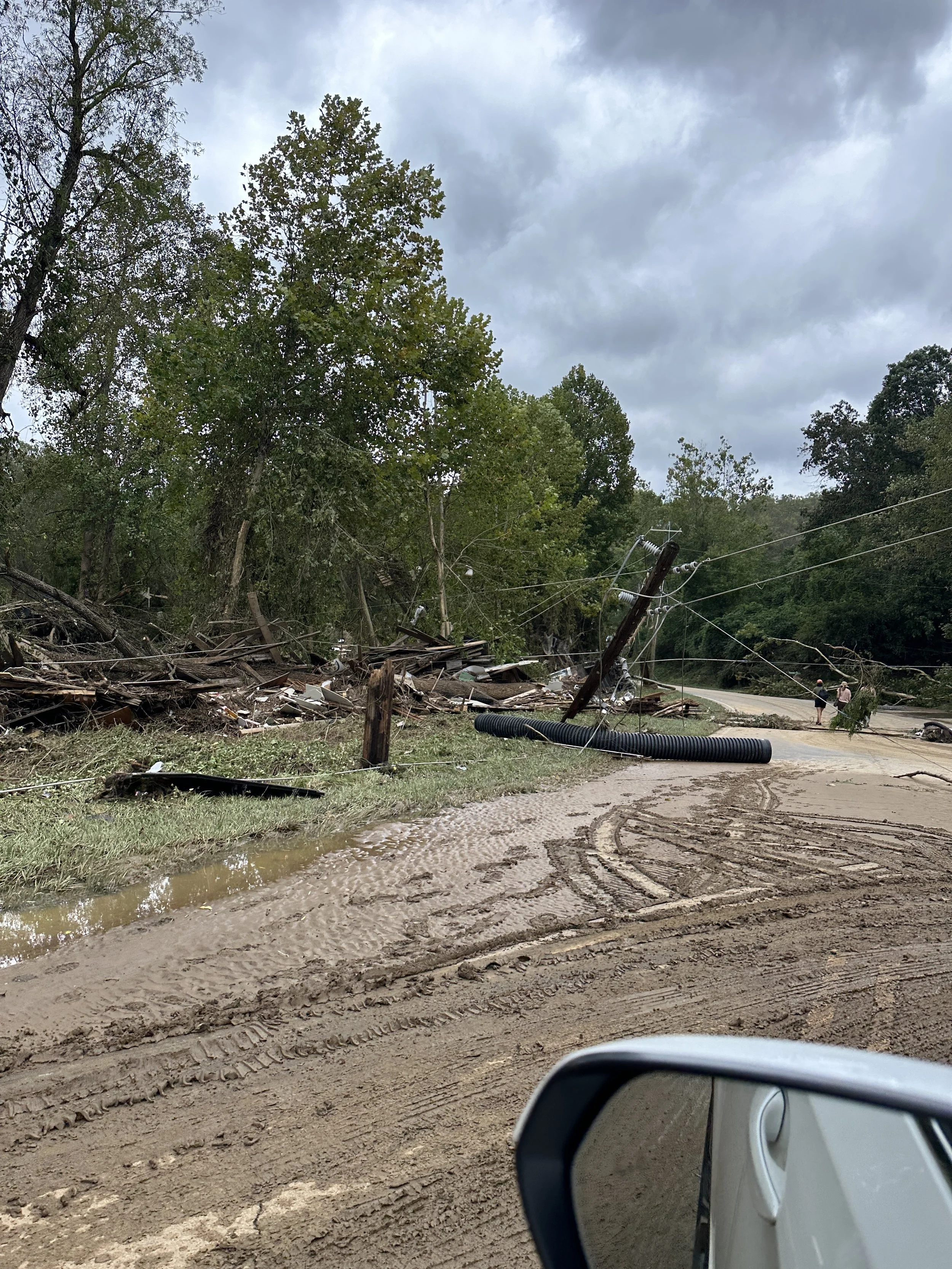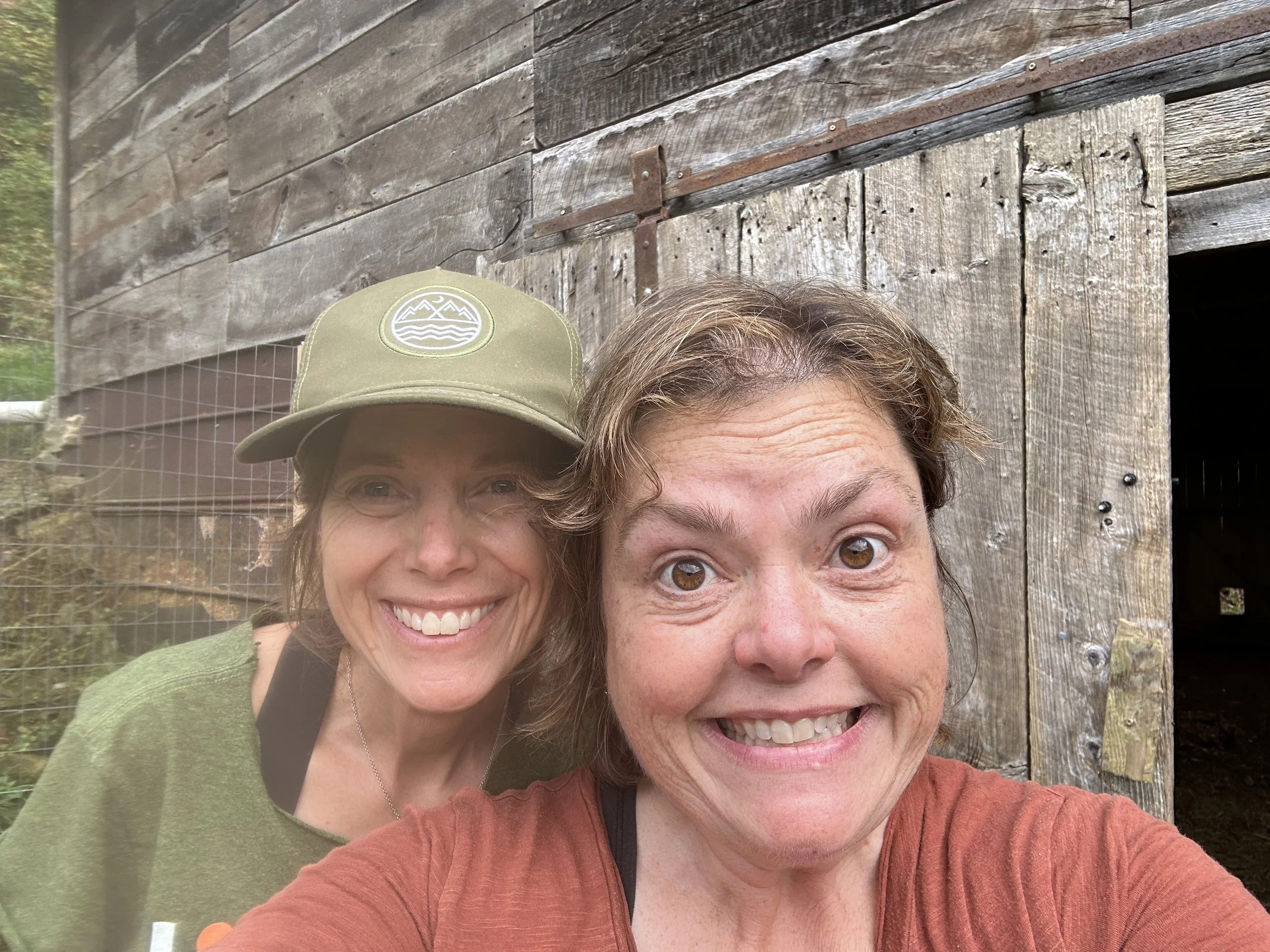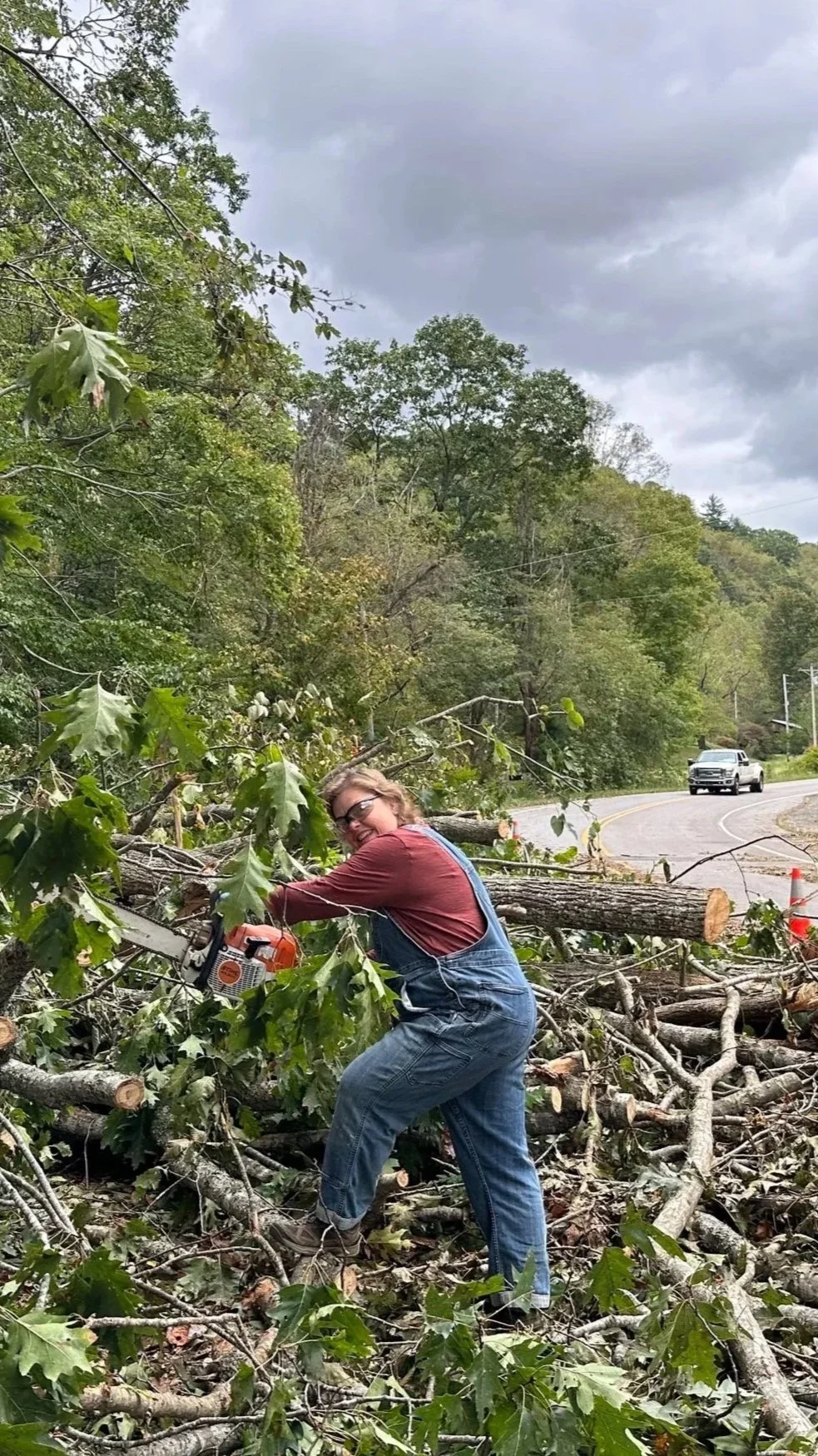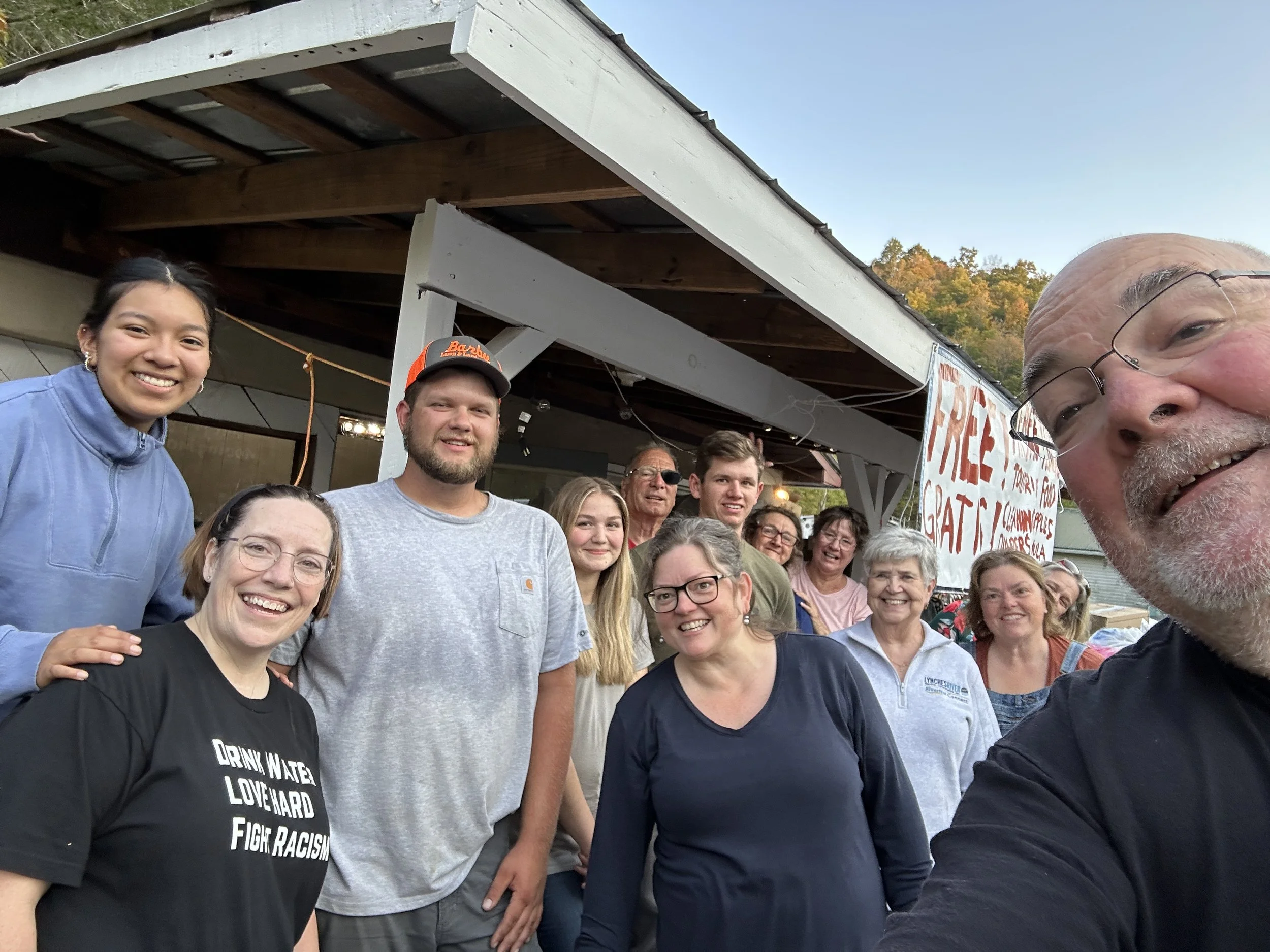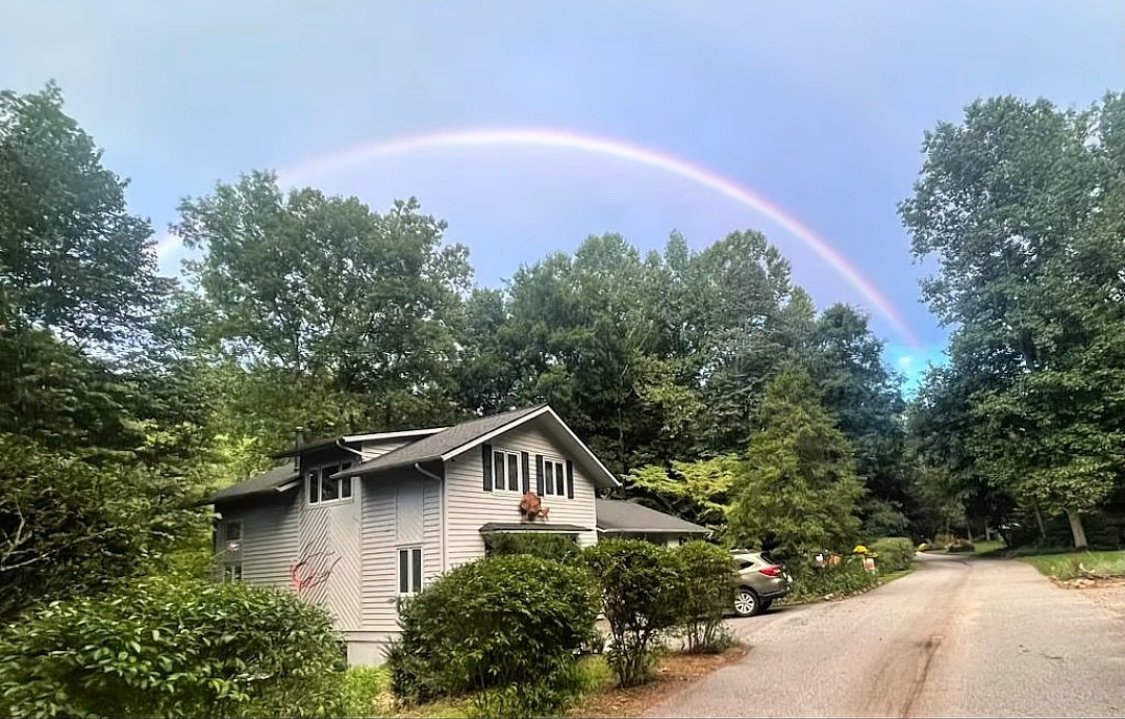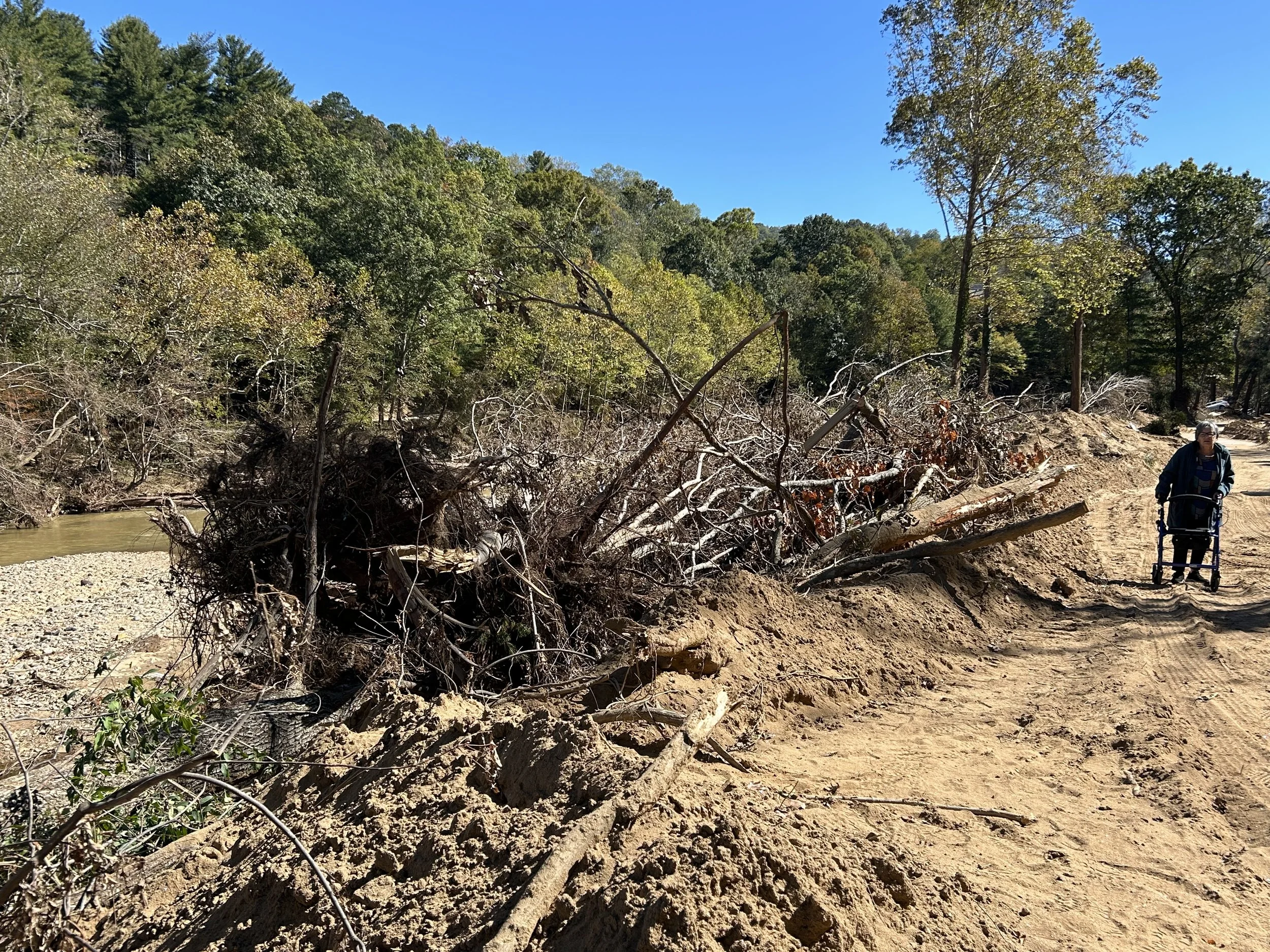A Year Later: Another Helene Memoir
Prelude
All around my home and reaching for a hundred miles in every direction, communities are commemorating one year since Hurricane Helene devastated an entire mountain region, an area of the world typically immune to tropical forces. There is a collective voice crying out and balancing the need to grieve, to remember, and to celebrate the unity of a community responding to a crisis. Over the past week countless people have posted their stories and journeys and over the past few days I, too, find myself with an ache to process my mounting anxiety, almost to the sensation of panic at times, as each picture, reel or story I swipe past brings my own memories and emotions closer to the surface. So, I write.
Chapter 1: The Journey Home
One year ago, Jared and I were on an exhausting and incredibly tumultuous race across the country in a compact rental car in an effort to outrun Helene and get to our little farm being cared for by my elderly mother and college-aged niece who were housesitting while we were away. No flights were going to be delivering us near our destination; many were grounded in Phoenix because the tarmac heat exceeded safety for flight departures, and countless other flights were being diverted along the entire east coast due to impending impacts from Helene.
GPS image as we left Phoenix and began the long journey.
I had, just the day before, been elected to the AAFP Board of Directors, a lifelong professional goal and momentous accomplishment; rather than celebrating the moment, it got pushed into a little pocket deep inside of me as Jared and I embarked on an incredibly long and unexpected journey when the path of Helene became clear. Immediately following my first board meeting, Jared picked me up at the hotel entrance in our recently acquired rental car and we began the 28+ hour drive, pushing through the night and into the next day, only stopping when we could combine gas with food and toilets in one frenzied stop. For twenty-eight hours we alternated naps and driving. When awake, the passenger followed social media and made calls to try and understand the emerging lay of the land, but communication became increasingly more difficult as we approached the east coast and as the storm wreaked havoc along the eastern seaboard.
One terrifying call was with our son, Eli, a college student in Boone who was calling from his girlfriend’s apartment as flood waters had begun rising around them. His house was on very high ground, but they could not get to it. In fact, they could not get anywhere because the surrounding roads and bridges had been rapidly overwhelmed with flood water. “Mom, the water is coming up to the door and into the garage,” he said nervously. A seasoned Class V whitewater kayaker, he understood the power of water better than most. “Do you have your boats there?” I asked. No, they were at the house. “Do you see a house on higher ground nearby? Can you ask to go in?”
He video-called not long after from the second story apartment of another Appalachian student neighbor who gave them shelter. On his video he showed the entire surrounding land was a rushing river and the water had already made it almost to the second floor. We watched an entire tree float by while we talked. And then he lost service.
We had not been able to reach my mom or niece, Ellie, all day but got the alarming news from my sister that Ellie had left the house first thing in the morning, mid-storm, because she was on-call as the RA in her dorm. But no one had heard from her or seen her since announcing she was leaving. That left my 82-year-old mother alone on the farm nestled into the side of a steep mountain to manage the animals and whatever else came. Stories of mudslides and landslides were mounting on the little news we could access as the map showed our seemingly endless approach home.
It was late on Friday evening as we finally made our way to east Tennessee but by then more roads were “red” or “closed” on Google Maps than not. All the major highways were closed on the maps. We knew several “back ways” across the TN border to our house in NC, which sits in the Pisgah National Forest. I navigated Jared using maps we had downloaded earlier in the drive, as cell service at this point was spotty even absent a hurricane. Every river crossing we encountered resulted in turning around; the bridges were washed out and impassable. A frantic call to my sister in Alabama—we had been communicating throughout the drive as she realized she would not be able to make it home—gave us real-time access to road closures that were reported. “There’s one more way I can see that looks open,” she said, and talked us through the tiny, at times one-lane, roads. We lost service fully at that point and did not get it back consistently for almost three weeks.
We approached the last hope of a final crossing and there was a police car with lights blocking the bridge and turning people around. We stopped the car and got out and I plead with the officer to let us cross. The bridge wasn’t washed out yet, but it was closer every minute. He was empathetic but firm. We would not be crossing that bridge on his watch. I explained that our home was literally only a few miles away as the crow flies, just one river to cross and one mountain to traverse, and we would be able to get to mom. I might have overplayed her infirmity if I am honest. He finally relented and shared that there was one more bridge across the Nolichucky which he didn’t think had been shut yet but wasn’t sure. He gave us directions on how to find it by navigating even more backroads and wished us Godspeed.
In a brief cell service moment, we got on a call with our older son in Chapel Hill. “No, no more word from Eli in Boone but the news says widespread flooding and power loss,” he told us. We explained where we were and what bridge we were going to cross to try to get home but lost service again.
Miraculously, as we approached the bridge, hearts hammering with the awareness that this was, literally, our last chance, we saw dark waters rushing beneath but no lights of police to turn us around. Jared and I looked at each other with relief and in silent agreement born of a long marriage, we silently drove across that bridge as fast as we could. Only an hour after that midnight crossing(we would learn almost a week later) that bridge would be washed completely away. And that was the last our son heard from us for days, that we were crossing that bridge…and that it washed away.
Our next nearly two hours of driving, a lovely scenic 20 minutes of switchbacks climbing and descending a mountain on a normal day, was a constant dodging of trees and limbs, roads blanketed in still green fall leaves prematurely dropped, pitch black everywhere we went. No lights in houses. No cars. Every turn ahead heightened our anxiety that this was where a tree would cross the road and we would be forced to stop in our compact rental car filled with business clothes. Not a boot to be found. Finally. Finally. We crested the TN/NC border over Allen Gap that would take us down to home. We began a “what if” game at this point. What if the road is closed here? Would we walk the remaining 8 miles? What if it was closed here? Would we walk 5 miles? Finally, we turned onto Big Laurel Road, certain we could walk that distance even with lightweight tennis shoes in heavy darkness, awake more than not for the prior 48 hours. We WERE going to get home.
Home, Sweet Home.
Chapter 2 Homecomings
Miraculously we got home in the wee hours to our dogs barking to the crunch of gravel under our tires. We fell into a deep sleep and awoke the next morning to find both mom and Ellie at the quiet and dark house, with every tub and bucket filled with water and the goats, chickens, barn cats and dogs happily running around. Power had been out a little over 36 hours at this point and Jared fired up the generator to help cool the fridge and freezer and run hot water for quick showers. A well is a beautiful thing. Ellie shared a harrowing story of an attempt to get to campus, waylaid by downed trees and power lines before finally stopping when a frantic neighbor was waving and yelling---she had stopped her car on a hot power line. Terrified, and in tears, she finally navigated the return trip to the house but was unable to signal her safe return to anyone.
Oblivious to the actual carnage in the region, and with no cell service or internet, we made plans to return the weary rental car that was already late. Unable to access the airport in Johnson City due to road closures we had learned about the hard way the night before, we decided mom would follow me in my car to the Asheville airport and make our way to her retirement community where I would drop her off.
The drive that normally took under an hour was closer to three as we navigated road closures, long lines of cars, a precipitously falling gas gauge, and reroute after reroute, dodging trees and roads covered with water. All the while we observed what can only be described as a postapocalyptic scene with stranded vehicles, 18 wheelers hanging in trees, roads under a foot of mud and silt, and dazed people wandering beside the highway looking confused. Despite the odds we made it to the airport, still unable to access cell service except for a brief stretch on I-26 where I could not place calls but was able to post something on Facebook and hoped family and friends would see that we had made it safely home. The rental car agent at the airport had a pile of papers and a panicked look in her eye and took the car with no questions asked about the incorrect location of return. They had no access to computers or cell service either, after all. (We would be called about the non-returned rental car periodically for the next 6 months until they finally must have found it.)
Just another washed out road.
We began to make our way to mom’s home travelling different roads than we came on. We passed gas stations with dozens of cars that blocked entire lanes of traffic but no one seemed to be moving. A swath of South Asheville on Sweeten Creek was destroyed, the infrastructure devastated by tree after tree across roads with power lines and poles crisscrossing each other. Driving over curbs, through barriers, and defying the occasional less-than-legal obstacle, we were less than half a mile from Givens when we met a road closure being guarded by a live police officer.
“I’m sorry, you can’t get past here,” the exhausted officer said. I explained that my elderly mother lived just there (you could see the entrance) and I was going to drop her and her things and verify her apartment was intact and safe to return to. “No, ma’am. No one can drive here,” he insisted. “Sir,” I pleaded, “it’s hard to describe how exhausted I am. I promise to turn into the entrance right there,” I pointed, “and be back out in thirty minutes. Please don’t make her walk this---she’s exhausted and she lives up a very steep hill and uses a walker. She can’t walk 50 feet on flat ground right now because of her back pain.” She looked appropriately pitiful. He grudgingly relented and we made our way to her home.
The retirement community had backup power generation for a few facilities and hers was included but only for limited use. The water was not flowing—and would not flow for safe human consumption for almost two months. “Are you sure you want to stay?” I asked. She affirmed she was ready to be home. No one imagined at the time that things would take so long to get better and there was simply no communication with the outside world to understand how all-consuming the destruction was.
My return trip took me along a different path as I navigated new road closures, familiar landscapes made completely incomprehensible by cars and trucks in impossible positions. Rivers ran directly under bridges that used to be a long distance down and traffic moved inches at a time. Roads normally peppered with buildings were simply no longer there; instead, new waterways replaced them. I tried to stop at my elderly aunt’s home to make sure she had water but was ultimately unable to reach her neighborhood, so I made my way up I-26 towards home until I was forced to divert to the old highway.
Stopping at my sister and brothers-in-laws café, on the old highway a half mile off of I- 26 at the last exit before the Tennessee border, I stopped to check on Bob. I knew he had spent the night at the café hoping to stay open on generator power. Across from the café up on the big highway were miles of stopped cars, people who had tried to leave the state but were stymied when the traffic stopped moving. What they did not know was that the interstate bridge washed out in Erwin, TN, along with an entire hospital. Of course, at that time, no one knew the highway would not open again for weeks, so the buildup of cars increased in length, with people waiting patiently in their cars for movement, but with time they began to get thirsty and hungry.
The only open restaurant for miles and days.
Bob was in the kitchen when I got there, a few locals were filling containers with coffee and welcoming stragglers who were beginning to come in from the highway. “We’re making sandwiches with everything we can from the fridges,” he said. “We’ll run out of gas for the generator soon and will lose all this so we might as well use it.” As word got out to the highway wanderers, more people came down from I-26 to seek out a flushing toilet and a cup of coffee and cold sandwich. The restaurant wasn’t open for business but it was bent on serving anyone who stopped in. There were people from Florida and Georgia trying to creatively navigate a way home when all the other highways were shuttered. There were people from Virginia and New York heading home north. Elderly and young, children and babies, pregnant women. Travelers and locals trying to find their way home.
Little Creek Café remained open seven days a week and would not charge for food for the following three weeks, never closing their doors, issuing a ‘pay as you can’ edict that meant everyone had a place to come if they were hungry or thirsty. After a few hours helping make sandwiches, I realized Jared would be worrying so I made my way back home down the final eight miles on Big Laurel Road in a “frogger-like” world of traversing trees, power lines, and limbs before turning up my drive to home.
Chapter 3 The Poor Get Poorer, Week One into Two
Over the next several days a few things became clear.
There was no gas. If you lived rural like we did, when roads are open as normal it’s a twenty-minute drive to the closest gas station. You can’t afford to waste the gas on the drive there and back just to find there is no gas. You rely on word of mouth from neighbors since there are no phones or internet, but the information is old when you get it. There’s no water because your well won’t run without a generator. If you’re lucky enough to have a generator you quickly learn the generator won’t run without gas. Cars won’t either. Gas became a critical commodity overnight and we eagerly quizzed everyone who stopped at the café for intel on where we might be lucky enough to find some.
When folks can’t keep food cold and you can’t pump water from your well, you get hungry and thirsty fast. Power and water would be a long time coming and the only way you could get gas, food or water was with cash on hand. Credit cards don’t work without internet or phone lines. Bank machines don’t spit out money even if you have it in savings. If you are not privileged enough to sit at home on piles of cash, or paranoid enough to stuff your mattresses with paper money, then you are in a world of hurt when the world shuts down.
You also can’t make money if there’s no power or water and your work is closed. You can’t go to work if your work has been washed down the river and no longer exists. Even if you get to work, your employers can’t access payroll systems, so people could not get paid. Cash was king in this crisis, and hundreds of thousands of people went weeks without a job in a new economy no one had anticipated.
In urban areas, relief stations began popping up after several days and the roads were littered with people trudging along with a case of water and bags hanging off their arms. Many places would not allow people to pick out what they needed but gave them a set number of items to make sure the abundance lasted. As I was able, I would make periodic trips to check on a few octogenarian friends and family to make sure they had food, medicine and water down in town. If you were elderly or frail, you became fully reliant on the kindness of your neighbors, and they had already showed up in force every place I made it to.
But, if you were rural, nothing was easily accessible and many homes remained unattainable. Stories were mounting of people up in the hollers with no access to their medications, with long driveways blocked and no way to clear them, of people being hungry and thirsty. My sister was able to relay news to us via Alabama through sporadic cell service and internet at Little Creek which helped us stay abreast of the outside world. When I was home it was like the outside world simply no longer existed. Once a day Jared would hike to the top of our mountain and could sometimes get a bar or two of service but that was not guaranteed.
One day early on Mitchell sent me a message that took my breath away. She had seen a post looking for any information on one of my best friends going back to my residency days and the doctor for most of my family, that she and her entire family were missing. They lived down in Barnardsville, a community that experienced incredible destruction, and I knew their home and farm were beside a big creek. The post said that the last word anyone heard was a call from from the attic where the family and pets were huddled together as flood waters filled their home and they were trying to reach 911 for a rescue. No one had heard from them since then.
This beautiful family, who donated the food they farmed to feed the hungry. Two young boys. So many people had been washed away and the news was increasingly devastating on search and rescue finding anyone alive. Through a series of Facebook trolling and attempted text messages to close friends we pieced together what information we could and loaded up our truck with water, chainsaws and medical supplies to go on a search and rescue mission. As we waited in a long line for gas so we could make it there and back my heart raced with the anticipation of what we might find. As we were finally pulling away from the gas station close to dusk my phone rang and it was my friend’s mother. They had made contact. They were alive and unharmed, but their property was impassable and getting communication out had required a several mile trek on foot to find someone with service.
Hot and sweaty friends.
The next day we made contact with them directly and arranged for my sister and I to hold on to their goats and chickens for safekeeping while they began their recovery work. Their front yard and animal enclosures had moved from green fields to a rock and mud-filled river. I have never been so happy to see a smiling face as I was when they pulled up to my sister’s house with a Subaru full of goats and chickens.
The café stayed open and those first days we helped there or Jared and I would take our chainsaws to the trees blocking the roads, knowing the DOT had bigger fish to fry. The café got gotten power back on early because it was on a line with the only gas station for miles and while gas was not yet flowing we were thrilled to have a place to charge devices. Local restaurants began bringing their deep freezers full of food before they thawed and donated them to the café and Little Creek continued to serve everyone who walked in the door. Occasionally someone would drop a $20 dollar bill in the tip jar and Bob used what cash came to make sure his staff had money in their pockets when they left. Next to the Café was an old garage that my sister had been clearing to open as a “Mercantile” to sell local crafts and produce. My sister said a nurse in the community had sent her a message and asked if we could set it up as a medical site, so we rolled up our sleeves and cleared it out. We brought over chairs and any medical supplies we could scrounge from our houses and “opened shop”. Very few doctors’ offices or pharmacies had been able to open and there was an urgency to create a space for people to access healthcare. “We should have other supplies for folks, too,” she said. “Just if people bring things by.”
I became quite proficient with a chain saw and even got my own after the dust settled.
Between the two of us, another local retired doctor and Asheville nurse, someone was available for basic medical care during daylight hours every day of the week. Mostly we helped problem solve and check vital signs and treated the occasional injury. Random strangers from other parts of the state and country began to stop and drop off donations to put on the shelves for folks who needed them. Sometimes it was food for people and pets. Formula for babies. Paper products. Sometimes a chainsaw or a five-gallon container of gas. Suddenly the medical component of this relief site became a tiny closet in the back of the room and the building was overflowing with donations of supplies and food. We made a map of the area and when folks would stop and ask how they could help, we would point them to different areas of the community and ask them to load up their cars and take supply bags to the folks who couldn’t get out.
The old highway that ran in front of the café had opened into Tennessee and that was the only way between our states so the traffic was high. We took the big sign from my AAFP board of directors run and painted on the back to hang from the building to let folks know it wasn’t a store, but a free supply site and the volumes increased even further. There were days when we would empty and restock the shelves two or three times, unloading the trucks of strangers and then emptying them back into the community.
A steady supply of water stayed outside the building 24-7 for a month.
Chapter 4: When Does Normal Come?
It became abundantly clear that Asheville was not going to get water or power as quickly as expected, so I packed up my octogenarian mom, aunt and niece and trekked to Charlotte for two nights so I could see patients in clinic and they could have air conditioning, hot water and comfort food. I have never seen anything quite like the bucket brigade in mom’s retirement community, where sweaty elderly people lined up to pass buckets of dirty water from the pond to deliver to the apartments of people who could not make the walk so they would have water to flush their toilets. The brigade went up a hill and several flights of stairs and lovingly brought malodorous brown water to make sure everyone could make the best use of what little modern amenities they had.
Just a week into the response, our trip to Charlotte was challenging as many roads remain closed. We were surprised by how long we had to travel before gas flowed and the devastation we saw driving down the mountain that reached nearly the whole way to Charlotte, the path of Helene bigger and broader than we had imagined. For two days while I worked, Ellie managed the ladies, and on the return home we loaded the car with generous donations from coworkers at the health department. My aunt had run out of medications. Mail delivery had not resumed and we could not find a pharmacy open in Asheville so we found a Sams club in Charlotte who was willing to provide an emergency supply of her medication and stopped on the way home to stay at her son’s house in Oteen. This drive took us up I-40, which had just opened back up again. Driving through the devastation in Swannanoa and Oteen was breathtaking. Dust clouds from silt and mud filled the air and people walked with bandanas covering their faces to filter the foul air. Four lane roads were closed because entire houses had floated, then settled, into the middle of them, bridges were no longer there, and as power had still not been restored, driving remained a scene out of Mad Max.
We were 10 days into the disaster and still had no power at our house and no cell or internet access. We would run the generator for an hour a few times a day to keep the fridge and freezer cool and to run the well for showers and fresh water for cooking on our propane stove. In the middle of what would be a very long three weeks of recovery, mother nature gave us a light show one night in the form of the aurora borealis right there outside our bedroom window. It is hard to describe how much hope and joy came from those other-worldly colors shooting into the sky from our little perch on the mountain, but I am convinced it gave me what I needed to keep energy and stoke high and optimism alive.
Our own light show in a field of darkness.
Chapter 5: Navigating Pride
As word got out that our relief site was well stocked, we continued to have a heavy flow of traffic in the form of helpers, strangers and folks in need. At least a few times a day a beat-up car would pull in and hesitant people would look around cautiously. “It’s all free,” our then mighty crew of community volunteers would share. “Take what you need.” And still, many left without anything or with just one roll of toilet paper. “Other folks need it more than me,” was a common refrain. Sometimes they would just say they wanted to stop by to help and asked if we needed anyting. We finally sorted out that this was that amazing Appalachian pride. You don’t take what you can’t give back or pay for. So, when someone appeared to be hesitant, we would ask them if they had any elderly neighbors, and could they load up their trunks to take supplies to them? Or, when they asked if we needed help, we would point them to a new pile of donations and ask if they wouldn’t mind sorting out things. Invariably, after pitching in, they because much more comfortable leaving with some dog food or dish detergent, and some who lived close became regular volunteers.
We had a crew of locals who would drive by once a day with a list of what other supply sites needed, and we’d share what we had and give them a list of what we were short on. “We sure could use some size 3 diapers, we’re totally out, but can I give you these cases of size 2’s?” “Any peanut butter or canned meat? The fire station is all out.” Batteries, trash bags, laundry detergent. The needs shifted day by day. Locals I had never met and who after day after day of working together for weeks, I have not seen since. But I know they are around here if there’s ever a crisis.
My sister and I and our new found friend.
One of these unexpected angels drove up from the coast of South Carolina every week for three weeks to help staff the relief station, giving us a much-needed break. She would come bearing fresh baked banana bread or boxes of Girl Scout cookies to share with First Responders and a smile that simply never stopped.
The outpouring of support was incredible. I started receiving messages from churches and individuals who wanted to ship us things and wanted to know what we needed. A friend from Concord shipped cases of blankets, flashlights, and mailboxes. A friend of my aunts from Marshville sent up a truck the local church had put together, packed to the top with donations. A gentleman from a South Carolina had some generators to share so I worked with locals to find out who still didn’t have power and who might need it for oxygen or to keep insulin cold, and they delivered the generators and set them up, leaving an extra jug of gasoline as back-up.
Angels on earth.
A colleague from Ohio showed up with her daughter hauling a trailer full of new winter clothes and blankets, diapers and other supplies, and donated a huge generator for a local health center who still had no power. While she was there she volunteered at a medical tent in the next county over and returned another time with a friend from California and her daughter to volunteer.
A Mighty Crew from near and far—-one of the only pictures of Bob at work that I have found!
It wasn’t always fun and games. It was exhausting. There were tears. There were a lot of heartbreaking stories. There was occasional bad behavior. People who took more than they needed, who we might see several times in the same day. People whose cars were overflowing with goods they had already gotten from other sites. People who only took brand new things in the packaging that had resale value. There were a few who came in disparaging people of other races or ethnicities and accusing them of “taking all the stuff” or complaining that FEMA hadn’t even shown up. I would simply share that that had not been my experience and change the subject to put an end to the misinformation campaign some people seemed determined to propagate.
I learned a lot about donating things after being on the receiving end of three weeks of donations. One 18-wheeler filled with trash bags of clothes almost broke me. We had put the word out that we simply could not handle any more clothing donations. But people were driving from three states away and all they wanted to do was help. Sometimes they had been turned away by numerous donation sites before they got to us, and they just wanted to go home and report to their church that their sacred possessions had been shared with people in need. How do you say no to that?
Just one truckload of countless others.
Here are a few things I pledge to you. I will never, ever donate things that have not been freshly laundered. I will not donate things covered in dog hair, smelling of cat urine, or with holes and stains in them. I will neatly fold and label what I donate and place them in labelled Ziploc bags. I will not donate things by throwing them into trash bags, mixing shoes and clothing and toys and household goods in one place. Above all I pledge to never donate dirty dishes or used deodorant.
Chapter 6: You Can’t Go Home Again
Almost three weeks into the recovery, power was back on and the well was again giving us fresh water at home. Internet would take another week to be restored but measurable progress had been made. Asheville still had no water so I continued to make periodic trips to check on folks. One day my mom and sister and I decided it was time to drive to Oteen and see what had happened to my parents’ house nestled on the Swannanoa River on more than an acre of land. Mom and Dad moved “back to Asheville” when our boys were little and were essential caregivers while Jared and I maintained active careers. Dad had been the after-school Tae Kwon Do driver and they lived there together until my dad died at the house, only two days into a hospice stay following a protracted hospitalization. In his final hours, in the hospital bed in the living room looking through the A-frame window out onto the river, he waved at angels only he could see up in the sky and talked and laughed with family members who went before him. Only one year prior to Helene, mom reluctantly sold the house and moved into a retirement community, more for our comfort than hers. We had heard the damage to her community in Botany Woods had been profound. She had already lived through a couple significant floods in that home but we had no preparation for what we would encounter that day.
Her road along the river had held over twenty houses, some new and some quite old. The neighborhood boasted a truly tight-knit group of friends who watched after one another and the typical squabbles over repaving. Mom made her river access available to all during COVID when the stay-at-home order challenged families with children and was actively involved in the community and had missed it mightily since her move. As we approached the top of the road that took a steep turn down to her street, there were cones blocking off access and a neighbor sat guard. She recognized my mom instantly and told us about the devastation so we would be prepared when we got down there. She also told us sad news. One neighbor and his dog were still missing, having been washed away while standing on the roof of his house as neighbors watched from a house above. He had been sure this would pass like the others and declined the invitation to join the others on higher ground; certainly no one expected every house to be lost to the surge of the river.
She moved the cones for us to pass and we drove down as far as we could. It is hard to describe what was missing unless you really know what it had been. Where there had been neat rows of houses there were upside down cars, trees, massive rocks and piles of sand and mud and silt. No road remained. The river sat in a completely different place with channels and rock piles that had not existed before. The houses were just…gone. There was an eery silence as we walked the land, trying to identify the familiar and well loved landmarks. Where Papa Pete had fished with the boys. Where we held his wake. Where mom entertained Symphony goers in an annual fundraiser. Where we had spent countless hours dropping off and retrieving our kids at Deeda’s and Papa Pete’s. Where we said goodbye to dad, and toasted him, surrounding his bed with Salty Dog’s in his final hours. Where did it go?
Below is the view. Imagine that the photographer is standing in almost the exact same place in both pictures---one from the year before, right before moms move, to that same viewpoint, 18 days after Hurricane Helene.
Almost exactly one year before.
Where the house stood before there was now a wasteland.
Epilogue
There are so many stories to be told.
…people who lost their homes but still held the responsibility to pay a mortgage on nothing and find a new place to live and pay for simultaneously.
…people who were renting and lost their homes and were unable to find another property with affordable rent with the tremendous increase in demand.
…people even now, a year later, still waiting on repairs to their homes and living in a rental property.
…people who lost their cars to flooding but insurance only valued them at a tiny fraction of what they could buy a new, used car for, leaving with them with debt they could not afford.
…people who went months without income, who moved away from the area, who stayed in tents and campers through a harsh winter.
…people who lost every single thing they owned, their past and possessions rinsed into oblivion.
…large and small businesses who tried to survive a month (or more) of lost income only to fold, insolvent.
…people who washed away down the river on roofs and whose bodies were later recovered in trees.
…people whose bodies remain missing.
It has been a year since Hurricane Helene and there are still entire swaths of Western North Carolina who have not recovered.
To commemorate the anniversary of Helene Jared and I decided to invest in solar and on the very week anniversary serendipitously, it was installed. We now have a renewable energy source to keep that well pumping when the next disaster strikes.
Renewable energy in progress.
We feel incredibly lucky. Blessed. All those words we like to use to describe escaping tragedy. The survivor’s guilt is real. For those of us who escaped relatively unharmed, there is a tremendous burden of moving on unscathed. The impact of surviving this disaster touch everyone even if you don’t live in WNC. So many people had loved ones they could not reach and spent days and weeks fearing the worst. Locals who were trapped outside and could not get home who had to watch the news and hope for a glimpse of their home or loved ones. Others who had celebrated marriages and birthdays and found a corner of this mountain paradise to be their safe and favorite place and are even today grieving that loss.
For most of us who have lived obliviously, not having experienced a widespread catastrophe, I think we probably walk each day with a slightly heavier step. And, we walk in the knowledge that we are not alone, and that community is everywhere even when we don’t see it.

